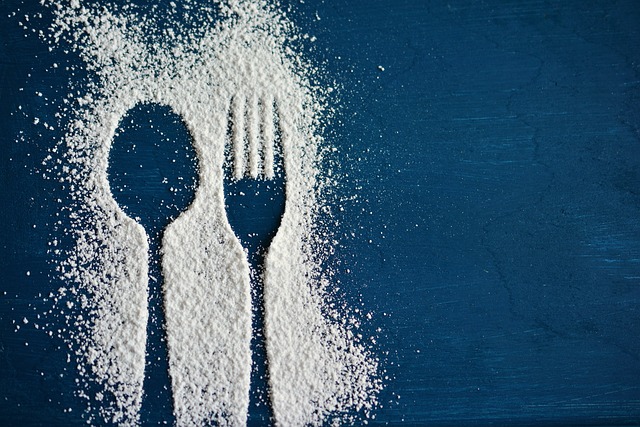Your Anxiety Loves Sugar - How Eating Sugar Affects Your Mind & Body
"Science finally tells us why it's so hard to quit sugar" this article by the NY times has been around since 2015 here's what it says
"Now, a small new study in the Journal of Clinical Endocrinology and Metabolism might tell us why: Researchers at UC Davis found that eating sugar shuts down the release of the stress hormone cortisol. In other words, sugar soothes us when we’re feeling stressed, which could be making us come back for more and more."
While this may be comforting in the short-run, it has several adverse effects in the long-run
Every time you eat something, it has an effect on your body. You may be aware of some and others may be subconscious.
- Sugary foods actually have a strong physiological effect on your body, this is why it's so hard to stop.
- It gets even harder when the sugary product is high in fat especially refined sources of fat like oil or animal sources of fat like dairy.
- If you are going through a stressful time quitting sugar may make you feel so much worse because your body is actually feeling comforted by it.
It's time to say goodbye to sugar
Sugar is not just bad for your teeth, it is also linked to health problems like diabetes and obesity. Sugar is found in many processed foods, both sweet and savoury including bread, pasta, cereal, crackers, cookies, cakes, pies, ice cream, yogurt, and even fruit juice.
The harmful effects of high sugar intake are well known, which is why we discuss them so often.
While cutting out sweets can lead to a healthier body, it’s not just the physical effects of sugar that we need to be concerned about.
Mood swings? Sugar may be the culprit
Find yourself reaching out to a dessert or soft drink at the end of a long day? This may make you feel more energetic immediately, but a sugar crash follows the sugar rush
Sugar may not be such a great pick me up after all. Research studies shows that sugar-laden goodies don't really have a long-term positive effect on mood. In addition, since your body is comforted by eating sugar in the short-run, you may find it extremely difficult to quit sugar.
Sugar can weaken your immune system
When we're stressed out, our bodies release adrenaline, cortisol, and other hormones that help us cope with the situation at hand. But if we keep doing this, we'll eventually get sick. So instead of reaching for a pint of ice cream, try taking a walk around the block, meditating, or practicing deep breathing exercises.
Sugar suppresses the hypothalamic-pituitary-adrenal (HPA) Axis in your brain, which regulates your response to stress. This make you feel calm. This relief is temporary and makes you more dependent on sugar. Moreover, increased sugar consumption further raises your risk of chronic diseases like obesity and diabetes.
Although this was a relatively small study with 19 women participants, the findings of the study was in line with others where a link between sugar consumption and anxiety was established. Researchers are looking forward to seeing more such studies being conducted
Sugar can cause you to feel depressed
Comfort foods are hard to resist, especially after a difficult time.
However, the cycle of consuming sugar may only make your feelings worse.
Studies have shown that diets high in sugar may be linked to obesity. Sugar consumption causes imbalances in certain neurotransmitters in the brain, which increases risk of long-term depression & mental health issues.
Although this was a male-only study, the effects of sugar on mental health has also been observed in women.
Addiction
A recent study found that people addicted to sugary drinks are more likely to use cocaine. Researchers asked participants to complete questionnaires about their food preferences and drug use. They found that those who preferred sweetened beverages had a greater likelihood of engaging in both behaviors. In addition, the researchers discovered that the mere sight of a milkshakes triggered the same reward centers of their brains as did cocaine.
The findings suggest that the simple sight of a sugary drink could lead to a desire for more. This is especially true for individuals who already suffer from addictive eating habits.
Withdrawing from sugar can feel like a panic attack
It may not be as easy as you think.
Withdrawing from sweets can actually cause side effects such as:
- anxiety
- irritability
- confusion
- fatigue
Substance abuse of drugs like cocaine leads to withdrawal when the addict stops using or tries to quit.
According to Naidoo, cutting down sugar altogether for those who have been having lots of sugar in their diet may lead to them feeling a physiological sensation of "withdrawal"
This is one reason why cutting out sugar all together in one go may not be the best way forward for those suffering from anxiety.
“Sugar addiction is real,” Naidu says. “It’s not just about weight loss.” If you have an anxiety disorder or depression, your body may react differently to cutting back on sugar. For example, you might feel anxious or depressed when you cut out sugar. Or you might feel irritable.
How sugar affects your brain?
A study published in the journal Neuropsychopharmacology found that sugar affects the brain in three distinct ways. First, it increases activity in the nucleus accumbens — the area of the brain responsible for pleasure and motivation. Second, it makes us crave more sweets. And third, it causes a surge in dopamine, which helps reinforce behaviors.
When people eat sugary treats, their brains release a flood of dopamine into the bloodstream. Dopamine triggers feelings of excitement and pleasure. We want to do things that make us feel good, like eating chocolate cake. But the short-term rush of dopamine doesn't last long. Blood sugar drops, causing hunger pangs. Then, as blood sugar plummets, the body releases insulin to help regulate the level of glucose in the blood. Insulin is supposed to calm down those cravings. Instead, it leads to increased appetite and food consumption.
Learning and Memory
In a study published earlier this month in Cell Metabolism, UCLA scientists report that consuming too much added sugar causes insulin resistance, which leads to damage in the hippocampus, one of the brain regions responsible for forming memories. This causes the animals to lose their ability to navigate mazes, even though they are able to find food and water.
The research team fed male rats either a normal diet or a high-fat, high-sugar diet for six weeks. They then tested the rats' spatial navigation skills by putting them into a circular maze with eight different routes leading out. At the end of each day, the researchers gave the rats access to food and water, and recorded how long it took them to find their way out of the maze.
After four days, the rats on the sugary diet had trouble finding their way out of the labyrinth. On average, they spent nearly twice as long trying to figure out where they needed to go as the rats on the healthy diet. When the researchers examined the brains of the rats, they found evidence of insulin resistance in the hippocampus.
Sugar weakens your ability to deal with stress
The study published in Psychoneuroendocrinology used functional magnetic resonance imaging (fMRI) to measure changes in blood flow in the brains of women while they viewed images of food and neutral objects. When subjects saw sweet foods like chocolate and ice cream, the researchers observed increased activity in areas associated with emotional processing. In contrast, viewing pictures of vegetables and fruit resulted in decreased activity in those same regions.
Researchers believe that the HPA axis plays a role in regulating the body's response to stress. "When we are stressed, our bodies release hormones such as epinephrine and norepinephrine," says lead researcher Dr. Michael Berkman. Those chemicals cause the heart to beat faster, breathing becomes shallow, and muscles tense up.
In addition to suppressing the HPA axis, sugar consumption also suppresses the sympathetic nervous system, which helps regulate responses to stressful situations. This can make it harder for people to cope with life's challenges.
Sugar Causes a Serotonin Crash
The brain chemical serotonin helps us maintain our mood. When we’re happy, serotonin levels rise; when we’re sad, serotonin drops. This is why people often say they feel better after eating chocolate.
But did you know that sugar causes a serotonin crash? Eating too much sugar makes you feel low and depressed. Research suggests that this happens because glucose, the simple sugar found in foods like candy bars, cakes, cookies, and soda pop, stimulates the release of insulin, a hormone that regulates blood sugar levels. Insulin triggers the production of dopamine, another brain chemical associated with happiness. Unfortunately, dopamine doesn't stick around very long, so you end up feeling less happy than you did before you ate those sugary treats.
This effect lasts about 30 minutes, and it takes longer for someone whose body isn't used to high levels of sugar to recover. So it's best to limit your intake of sweets if you want to keep your mood stable.
Sugar Increases Brain Inflammation
Depression is one of the most common mental health disorders worldwide and it affects people of all ages. Depression often goes undiagnosed because many people don't think they're depressed, and even those who seek help often struggle to find relief.
A recent study published in Cell Reports found that sugar increases brain inflammation, suggesting that diet could play a role in mood regulation. Researchers from the University of California San Diego School of Medicine showed that mice fed a high-fat diet had elevated levels of inflammatory cytokines in the hippocampus, a part of the brain associated with memory formation and learning. When the researchers switched the mice to a low-carbohydrate diet, however, the levels of these cytokines dropped dramatically.
The findings suggest that diets high in carbohydrates might contribute to depressive symptoms by increasing the production of proinflammatory molecules in the brain.
The Role of Tryptophan
Tryptophan is an essential amino acid that is necessary for proper brain function. Serotonin, another neurotransmitter produced by the brain, helps regulate sleep patterns and appetite. Tryptophan helps make serotonin, a neurotransmitter that regulates mood and sleep patterns. When you consume too much sugar, your body produces less serotonin, which may lead to depression or anxiety.
Several studies have proposed that low concentrations of tryptophan are linked to increased risk of eating disorders and even suicide.
A diet rich in high-tryptophane foods may help boost mood and manage cravings. Foods containing tryptophan include nuts, seeds, beans, avocados, broccoli, cauliflower, bananas, oranges, tomatoes, mushrooms, eggplant, cabbage, spinach, carrots, peas, and lentils.
Sugar and emotions
Emotions play an important role in our lives. They influence everything we do, including food choices. However, it is still unknown what effect sugar has on emotion regulation. Recent evidence that suggests that sugar intake affects the functioning of the HPA axis, thereby influencing emotional responses.
The role of neuronal pathways in sugar consumption and disease
The brain processes information about food intake and reward via common neural circuits. These circuits are involved in many different behaviors including addictive behavior, stress response, emotion regulation and appetite.
Neurobiological studies show that exposure to a palatable substance like sucrose activates similar regions in the brain as cocaine, heroin and opiates do. In addition, the same areas respond to stress and anxiety, suggesting that the brain uses similar mechanisms to regulate these experiences.
In humans, the experience of craving is often accompanied by feelings of pleasure, which may contribute to the development of addictions. However, it is unclear how much of the subjective feeling of pleasure is due to the actual taste of the substance versus the anticipation of obtaining it.
Sugar Hurts a Healthy Gut Too
Our gut contains about 100 trillion bacteria called microbes. These microbes help us digest food, produce vitamins and hormones, and even keep us healthy. However, recent research suggests that we're now consuming too much sugar, processed foods and artificial sweeteners, which are damaging our gut flora. This can cause inflammation, leaky gut syndrome and ultimately, mood disorders like depression and anxiety.
In one study, participants consumed either a low-fat, high-fiber diet rich in whole grains or a high-sugar, low-fiber diet. After three months, those on the latter had lower levels of beneficial gut bacteria such as Bifidobacteria and Lactobacillus. Another study found that people who consumed sugary drinks every day experienced greater intestinal permeability, meaning that their intestines become more porous and allow harmful substances into the body.
A recent review of six studies showed that individuals with depression had fewer good bacteria and more bad bacteria in their guts compared to controls. And another study found that children with autism spectrum disorder had less diversity of bacteria in their guts compared with typically developing kids.
Sugar Affects Your Sleep
The average adult consumes about 20 teaspoons of added sugars each day, according to the American Heart Association. This includes soft drinks, fruit juice, sweetened tea, baked goods, condiments, and sauces. These sugary beverages contain a lot of calories, but they don’t necessarily provide much nutrition. In fact, some studies show that consuming too many simple carbohydrates could disrupt your sleep cycle.
A recent study published in the journal PLOS One examined the effects of different types of food on sleep patterns. Researchers asked participants to complete a questionnaire about their eating habits, including how often they ate certain foods, what type of food they preferred, and whether they had problems sleeping due to stress or anxiety. They then used polysomnography — a test that measures brain activity during sleep — to record their sleep cycles.
Participants reported sleeping better when they avoided sugary snacks and drank water rather than soda. However, those who enjoyed dessert most often experienced poorer sleep quality because of increased levels of cortisol, a hormone produced when we feel stressed out.
Craving something sweet? Enjoy desserts without deserting your health
You don't have to give up sweets entirely if you're cutting back on processed sugars.
Download Sugar-Free Whole Food Plant-Based Recipes and enjoy making them at home.
You can order sugar-free sweets here.
Next Steps - Get Started Today
Are you looking to eat healthy? We may be able to help you
- Book an online consultation with Dr. Achyuthan Eswar to learn how best to deal with it.
- Sign up for our Plant Based Diet Masterclass on NutritionScience.in to better understand the numerous benefits of adopting a whole food plant based diet.
- Access our free course to help kickstart your plant based food journey.
- Subscribe to our 100% whole food plant based balanced meal plan, delicious & doctor designed to help you get all your macro and micro nutrients, from the comfort of your home - Bengaluru only
- Our Healthy Executive Thali Subscription is packed with variety and affordable too - Bengaluru only
- Stock up on delicious sweets and snacks that are sugar/jaggery-free, oil-free, maida-free and plant-based - Available Pan-India
- Pizzas, Biryani, Parathas, Burgers and more! Check out our instant meals and special meals here
Be Blessed by the Divine!
Dr. Achyuthan Eswar.





